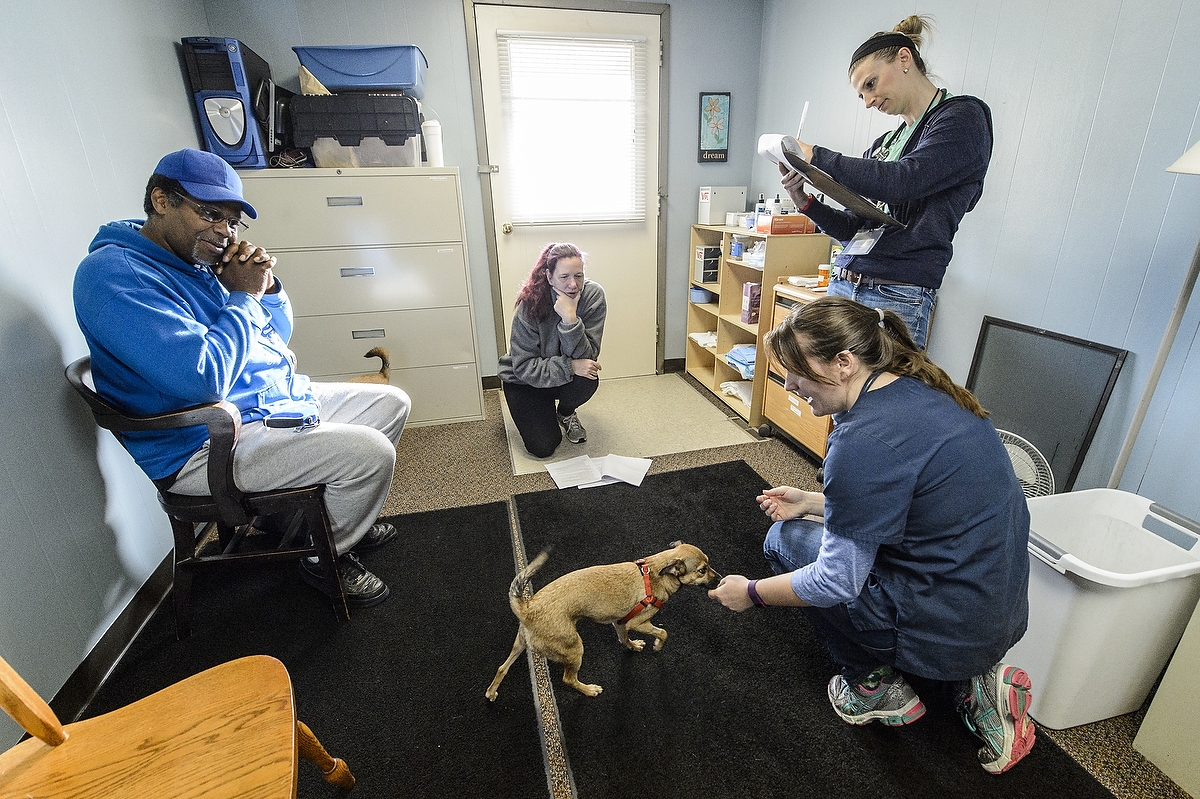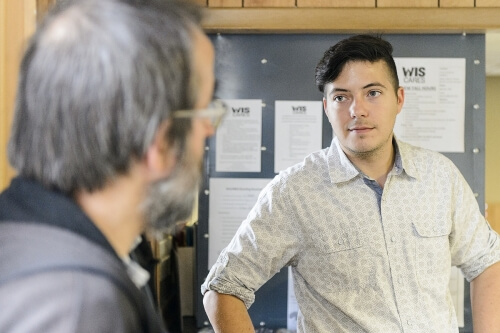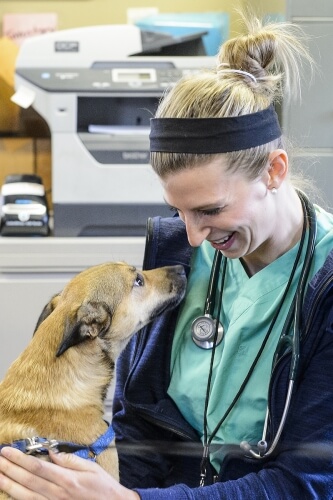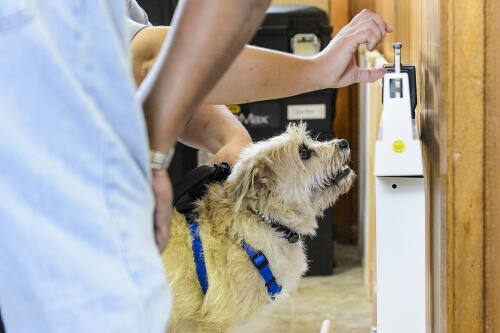Caring for pets and their people, even when housing is hard

Veterinary Medicine students Melissa Hayes (right) and Lindsey Meyer (far right) perform a check-up on Tina as her owners, Clarence and Kelly, look on. The clinic, which provides free care to those who are homeless or at risk of homelessness, is run by Wisconsin Companion Animal Resources, Education and Social Services (WisCARES). Photo: Bryce Richter
There is a light drizzle falling on a cool autumn morning when the clinic on Madison’s south side unlocks its front door.
“I’m hoping the rain didn’t deter anyone,” says Laura Soto, frowning. The third-year veterinary medical student at the University of Wisconsin–Madison checks the clipboard clutched to her chest. They’re expecting several patients, including a litter of puppies, this morning.
Typically, people come early to this clinic, waiting outside to receive care and supplies for their cats and dogs in need. Today, things are off to a slower start. Inside, though, the small clinic is buzzing with veterinary and social work students from UW–Madison, eager to provide for the pets and their people who will soon come through the door.
WisCARES – Wisconsin Companion Animal Resources, Education and Social Services – provides basic veterinary care for pets in Dane County, Wisconsin, whose owners are experiencing homelessness or housing instability. But it also does much more.
“It’s not just about the medical care for pets. It’s also a way to get people access to the other resources they need,” says William Gilles, the program director. “A lot of the people accessing our services are not people who the social workers involved in the program are familiar with, so we’re starting to identify a new population of people that just isn’t hooked up to the services that are available.”
Services like housing support and advocacy, food pantries, human health care and more.
Now in its second year, WisCARES has grown significantly since its origins as a call-in veterinary hotline that began with Gilles, a veterinarian and graduate of the UW–Madison School of Veterinary Medicine (SVM).

William Gilles (right), director of WisCARES, talks with volunteer vet Chuck Schobert. Photo: Bryce Richter
He helped start it while still in vet school, focused on providing animal and human health information to Dane County’s HIV positive pet owners. “My interest has always been increasing access to veterinary care,” he says.
Run by volunteers, the successful hotline allowed Gilles to “stay in the conversation about access to veterinary medical care,” even when he became a private veterinarian. But it was a later incident that he credits for WisCARES’ genesis.
“A homeless man came to the (SVM) teaching hospital with his dog who had an ear infection,” says Gilles. “The school has funds to help cushion some of these situations, but there was a miscommunication and he was turned away at the door because he wasn’t able to pay.”
While the man ultimately found help on campus for his dog, it prompted the dean of SVM – Vilas Distinguished Achievement Professor Mark Markel – to put out the call to do more. WisCARES was born.
‘These are our kids’
At the clinic this dreary Saturday morning, Gilles stands in the cramped downstairs break room of the building, which was donated by St. Vincent de Paul of Madison. The former Meriter Health Hut at 1312 Culmen St. is small and the basement sometimes floods, but Gilles and the team are grateful for the space.
It has two exam rooms, designed for human patients; a small waiting area with two desks; a tight space converted to a laboratory with the addition of a microscope; and a supply room for pet food, litter, flea medication and other items donated by local pet stores, industry and private individuals, including some WisCARES clients.
The veterinary student volunteers, seven in all, gather at the small kitchen table, poring over charts and checking their notes. Some of the animals scheduled in the clinic that day will be there to follow up on care they previously received.
One of those patients is Tina, who is there with her her brother, Ike, and owners Kelly and Clarence. Tina, brown and diminutive, was recently spayed at SVM and it is time to remove her sutures.

Veterinary student Lindsey Meyer greets Ike. Photo: Bryce Richter
Third-year veterinary medical student Lindsey Meyer, volunteering for the first time, remembers Tina from the surgery. Meyer and second-year student Melissa Hayes team up to provide her care while Gilles or another veterinarian, volunteer Charles Schobert, supervise and participate in each case.
“These are my babies,” says Clarence, who got Ike and Tina for Kelly as presents last Christmas.
“I begged him for a year for a pet and we got two for the price of one,” says Kelly. “I just couldn’t separate them.”
The couple brought Tina’s surgical paperwork and empty medicine vials. They discuss her runny nose and weight loss with the students, who record Tina’s heart rate, examine her sutured belly and ask about her bowel habits. Schobert, an SVM alumnus, enters the exam room to assist the students.
Together, they remove Tina’s sutures, and discuss Ike’s impending neuter surgery with Kelly and Clarence.
“We are very grateful for WisCARES and UW, for all the help, from pet food dishes to food,” says Kelly. “These are our kids.”
Students building skills
One of the goals of WisCARES is to provide hands-on, supervised educational opportunities to UW–Madison students.
“We focus on giving students a lot of case ownership,” Gilles says. “They are coming through this program before they hit their clinical year and it gives them the opportunity to take patient history and do physicals and to start building those skills. They might not have the medical knowledge yet to come up with the exact right diagnosis or treatment program, but it’s a great way for them to learn.”
There are now also 11 social work students – undergraduate and graduate – involved in the program. Along with volunteer social workers from the community, those students work with clients to determine their eligibility for the program and help connect them with housing resources and other social services. Maurice Gattis, professor at the UW–Madison School of Social Work, is a co-founder of WisCARES.
“The more we got into the research to lay the groundwork, the more we realized that for people experiencing homelessness, having a pet could be a barrier to accessing shelter, because shelters don’t allow pets,” says Gattis. “Some people sleep in their cars; some people stay in domestic violence situations because they’re afraid their pet will be abused.”
Often, people put their pets first. They will look for help for their cat or dog, but not for themselves.
“People care about their pets to the umpteenth degree and sometimes, their health or housing are not at the forefront,” says Arie Hylkema, a junior majoring in social work who volunteers at the clinic. “We are trying to get a good idea of where they are at, because most people don’t come here for housing advocacy but they are here and it comes up.”
In August 2014, in partnership with a community cat clinic and with SVM, WisCARES began offering short-term boarding for cats and dogs to help their owners transition into housing, address a medical situation, or have a safe place for their pet to stay when needed. Gilles says they hope to start a foster-like boarding network to serve more pets for longer periods of time.
“It’s been the most requested service that we run,” Gilles says. “It has been really rewarding to take a concern voiced by the social work community and see how it has been seamlessly filling a little bit of that need.”
In its first year, WisCARES provided veterinary medical care to 74 families, including 49 dogs and 32 cats. Between March and July 2015, it provided housing advocacy and social services at least once to 35 families and boarded six dogs and 10 cats for 14 families.
“When we were starting, people asked: ‘How many people are homeless with pets?’” says Gattis. “We have the data, but it’s not very good data because it’s hard to track. So we said: ‘We know this is hidden demand, we know we won’t be able to prove it to you now,’ and we kept moving forward.”
“As it launched, the hidden demand began to emerge,” he says.
Not all of WisCARES clients are homeless, but all have experienced homelessness or near homelessness in the recent past. Some don’t identify themselves that way, though they may be sleeping on the couch of a friend or relative.
“Individuals experiencing homelessness are more likely to be a victim rather than a perpetrator, so animals help. They provide companionship, help with mental health, reduce anxiety … they help in coping,” says Gattis. “Often, individuals experiencing homelessness are invisible. Having this animal day and night may provide this unconditional love that may be beneficial.”
Schobert says he often meets people who will go to sleep hungry so their pets can eat. “Pets are more than their pets,” he says. “Having an animal can really save lives.”
It was Ruthie, really, who likely saved the life of Shenanigans, the white ball of fluff she found running across Badger Road seven or eight years ago.

Veterinary student Georgia Wolfe weighs Shenanigans. Photo: Bryce Richter
“I don’t know that I would have a dog if I hadn’t found her,” says Ruthie, sitting in a clinic exam room. “It wasn’t the highest thing on my list, but it’s a good thing … she’s a love bug. My grandkids are crazy about her.”
She and her partner Eric learned about WisCARES from a food pantry and brought Nanny, as she’s known, to the clinic because she had been itching herself raw. Today they’re in for a checkup and Nanny is doing much better. Third-year vet student Georgia Wolfe talks to Ruthie and Eric about putting Nanny on allergy medicine and using an anti-itch shampoo, both of which she brought up from the supply room.
“I’m glad the clinic was here,” Ruthie says. “I got sick recently and money is tight … If something major happens, I wouldn’t let her suffer, but I didn’t have the money and I’m thankful.”
Wolfe says working with WisCARES clients feels more intimate than experiences in a more traditional setting. These clients’ pets, she says, “provide them with something essential, at an emotional level. They do everything they can for their animals.”
Building a network
The morning buzz has quieted to a hum and Gilles, who spent the morning darting from case to case, student to student, has a sudden lull in the push and pull of the clinic. He and Schobert stand at the bottom of the steep stairwell that leads from the clinic rooms to the lab and supply room, talking about a complicated case.
WisCARES’ mission is not to serve the highest volume of pets possible; rather, Gilles says it’s about building relationships and networks of support for people when they and their pets are in need. Gilles performs street outreach and works with others in Madison – from the Friends of the State Street Family to the Homeless Services Consortium of Dane County – to build and maintain those relationships.
It is the only program of its kind, Gilles and Gattis say, and they hope to expand even further by providing – through partnerships – field placement for social work students, mental health and substance abuse services, and more.
“I went into this with the expectation that I might have to convince people that this is a good idea, but overwhelmingly, the support has come out of the woodwork,” Gilles says. “It’s really surprising and it’s really heartening.”
Despite a joke in the veterinary world to the contrary, Gilles says he went to veterinary school for the people. His work with the clinic strengthens that resolve.
“Last winter, I went out with one of our outreach workers and picked up one of our clients,” he says. “We dropped him off at the men’s shelter and brought his dog to our boarding program. It was 10 degrees below zero that night and I felt like I was having a bigger impact on their health than I ever did as a general practitioner.”
“Being able to work with an owner who doesn’t have a lot of resources and give them the opportunity to feel like they’ve done something for their pet – that is huge.”
______________
For more information about WisCARES’ housing advocacy line, clinic hours and more: visit https://wiscares.wisc.edu/, email wiscares@vetmed.wisc.edu or call 608-561-7387.
For emergencies, call UW Veterinary Care at 608-263-7600.
Subscribe to Wisconsin Ideas
Want more stories of the Wisconsin Idea in action? Sign-up for our monthly e-newsletter highlighting how Badgers are taking their education and research beyond the boundaries of the classroom to improve lives.

